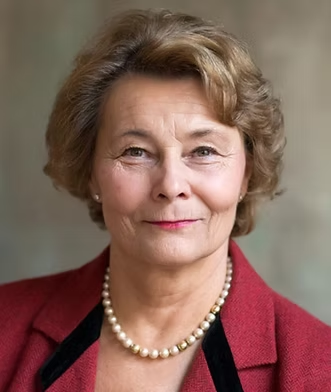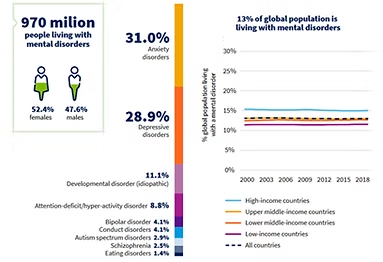
According to a 2022 World Health Organization (WHO) Report, 13% of the global population - in other words, 1 of every 8 people - lives with a mental health disorder (Figure 1). Among our most vulnerable populations, the numbers are no less alarming: 8% of children and 14% of adolescents struggle with their mental health. Despite the magnitude of the mental health disorders, only 2% of health expenditures are allocated for addressing mental health challenge
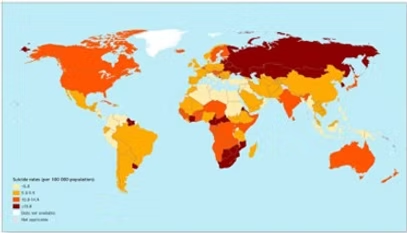
Psychiatric care plays a crucial role in individual and societal health and well-being. Globally, the economic and social burden associated with bearing the weight of millions grappling with mental health disorders continues to increase. It is critical to note that for individuals bearing the burdens of mental ill-health, the ultimate, tragic consequence can lead to suicide. The data illustrated in Figure 2 underscore the urgency of prioritising and improving mental health care worldwide
An umbrella review and meta-analytic evaluation of psychotherapies and pharmacotherapies for mental disorders of 3,782 randomised controlled trials, including 650,514 adult patients diagnosed with the most prevalent psychiatric disorders, showed that the effect sizes of treatments appear to be low and have plateaued, hinting at a potential ceiling effect in current research modalities (Leichsenring, 2022). This calls for a paradigm shift in research methodologies as well as a ned for identifying new methods to improve mental health by treatment and prevention. However, finding, developing, and getting approval for new treatments and preventive methods is a long process. In the meantime, we must concentrate our efforts on implementing existing evidence-based treatments and preventive methods that show relatively good efficacy.
To accomplish this goal, the WPA Action Plan October 2023-2026 prioritises the following actions: implementation of evidence-based therapies through the Specialist Corner, improvement and preservation of mental health through the adoption of healthy lifestyle choices illustrated in the Healthy Lifestyles Hub, research, and improved communication of knowledge and ideas.
Advances of science and their application in clinical practice

The Specialist Corner, created under the 2023–2026 WPA Action Plan by the President, Professor Danuta Wasserman is a platform designed to translate psychiatric research into practical clinical guidance. It provides clinicians in the webinars with accessible presentations of the latest scientific advances, helping to adopt evidence-based treatments across different psychiatric disorders.
The platform features online webinars covering different Psychiatric diagnoses, aetiology, symptoms, rehabilitation, and perspectives on gender, development, and culture. Follow-up short sessions during the same webinar prepared by several expert groups provide complementary perspectives on culture, comorbidity, public mental health, lived and family experience, ethics, digitalization, and physical health.
Vulnerable populations, including refugees, immigrants, and those affected by crises or trauma, are also addressed.
Expert Group on Comorbidity- Chaired by Professor Dan Siskind
- Dan Siskind, Prof. Dr., Australia
- Norman Sartorius, Prof. Dr., Switzerland
- Susanna Every-Palmer, Prof. Dr., New Zealand
- Ivona Šimunović Filipčić, Dr, Croatia
- Sean Halstead, Dr, Australia
- Toby Pillinger, Dr, UK
Expert Group on Lived & Family Experience- Chaired by Professor Michaela Amering
- Michaela Amering, Austria
- Helen Herrman, Australia
- Afzal Javed, UK / Pakistan
- Miia Männikkö, Finland
- Guadalupe Morales, Spain
- Charlene Sunkel, South Africa
- Soumitra Pathare, India
- Martha Savage, New Zealand
- Carlos Vinacour, Argentina
Expert Group on Public Mental Health- Chaired by Professor Jonathan Campion
- Jonathan Campion, UK
- Debasish Basu, India
- Geert Dom, Belgium
- Oye Gureje, Nigeria
- Vinay Lakra, Australia
- Crick Lund, UK / South Africa
- Michael Marmot, UK
- Shekhar Saxena, USA
Expert Group on Ethics and Legal Issues- Co-chaired by Professor Silvana Galderisi & Professor Neeraj Gill
- Silvana Galderisi, Italy
- Neeraj Gill, Australia
- Helen Herrman, Australia
- Antonio Melillo, Italy
- Kerim Munir, USA
- Calina Ouliaris, Australia
- Soumitra Pathare, India
- Jill Stavert, Scotland
- Charlene Sunkel, South Africa
Expert Group on Impact of Digitalization- Chaired by Professor Wolfgang Gaebel
- Wolfgang Gaebel, Germany
- Umberto Volpe, Italy
- Rodrigo Ramalho, New Zealand
- Helen Christensen, Australia
- Bridianne O'Dea, Australia
- Hussien ElKholy, Egypt
- Laura Orsolini, Italy
- Taishiro Kishimoto, Japan
- Heleen Riper, Netherlands
- Sandra Bucci, UK
- Maddalena Cipriani, USA
- Donald Hilty, USA
- John Torous, USA
Expert Group on Physical Exercise & Lifestyle- Chaired by Professor Andrea Fiorillo
- Andrea Fiorillo, Italy
- Dan Siskind, Australia
- Lukoye Atwoli, Kenya
- Francesca Cirulli, Italy
- Matteo Di Vincenzo, Italy
Expert Group on Culture- Chaired by Professor Mohan Isaac
- Mohan Isaac, Australia / India
- Renato Alarcon, USA
- Laurence J. Kirmayer, Canada
- Erminia Colucci, Italy / UK
- Marianne Kastrup, Denmark
- Meryam Schouler-Ocak, Germany
- Lamia Jouini, Switzerland
- Sneha Karmani, USA / India
- Neeraj Gill, Australia / India
The initiative’s goal is to promote best practices globally, with Member Societies helping implement webinars locally and translate materials into local languages.
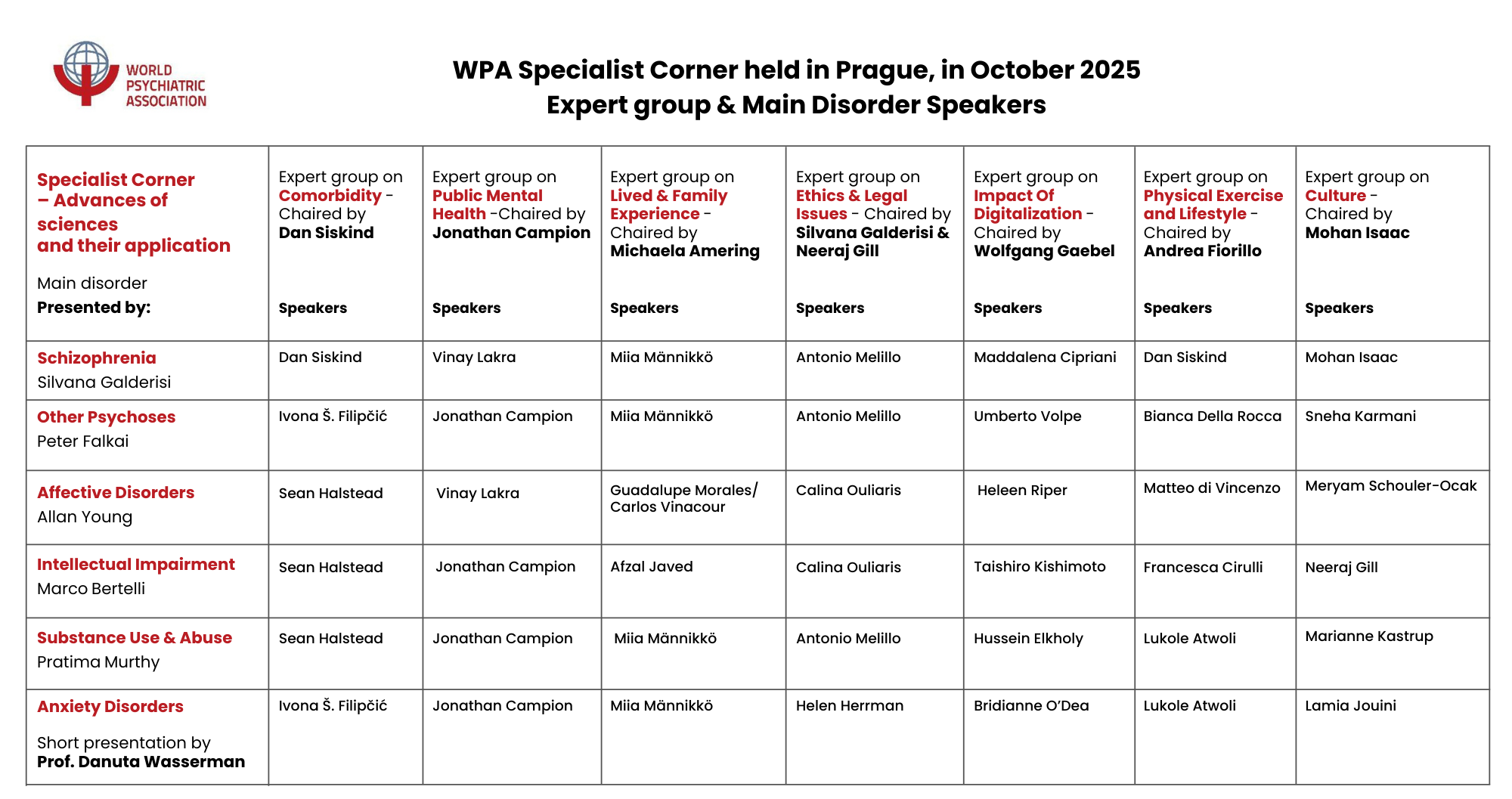
In this Action Plan, the WPA is developing a platform, called The Specialist Corner: Advances of science and their application in clinical practice, that will consistently update clinicians about the latest findings, enabling them to discern and adopt best practices.
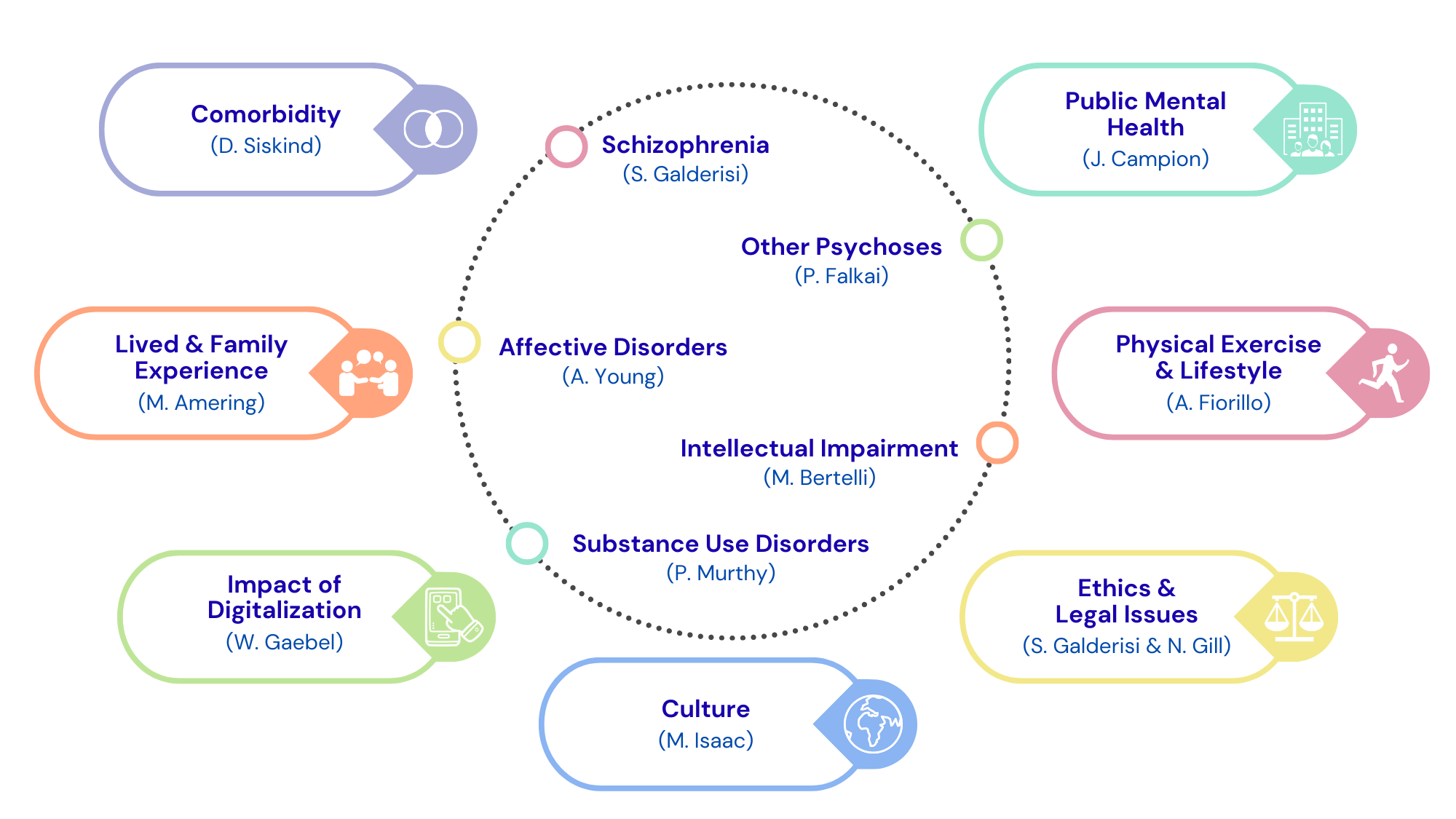
This Corner will serve as a hub to summarise advancements in clinical psychiatry, public mental health, and ethics, while fostering diversity and inclusiveness. The platform, dedicated to clinicians, will feature online webinars on different psychiatric diagnoses, where expert specialists will present, in an accessible, categorical approach, state-of-the-art treatments and best practices for daily psychiatric work, covering aetiology, symptoms, comorbidities with physical illness, and rehabilitation strategies from the gender, developmental stage, and cultural perspectives. This introductory categorical webinar (or webinars) will be complemented by a follow-up webinar (or webinars) on the same diagnosis, and will feature Prevention, Healthy lifestyles, Caregiver and family, Digital psychiatry, and Human rights/Ethics perspectives from experts in those fields.
The lead specialists for each mental disorder will appoint a consultative group of colleagues, representative of all the WPA’s geographical regions, to elucidate the topic from their respective, varied local perspectives and – simultaneously – share the availability of studies, gaps in research, and the potential for adaptations of existing materials to different cultural contexts.
Outcomes from these webinars will be summarised in written form for easy comprehension, intended for use as educational resources for patients, their families, and clinical staff.
All webinars, along with their associated materials, will be available on the WPA website.
The Specialist Corner’s ambition to foster the application of best practices, thereby ensuring that patients receive care based on the most recent and relevant evidence.
To achieve this goal, help is needed from all Member Societies to systematically implement the content of the webinars delivered, at both local and national levels, and to translate the written materials into local languages.
Promotion of healthy lifestyles to improve mental health
While there is evidence that healthy lifestyles boost general health, there is also growing proof of their impact on mental health across different populations. Choices to engage in physical exercise, eat a balanced diet, and adopt good sleep habits all have positive effects on mental well-being. Consistent sleep habits practices significantly enhance mental well-being by ensuring restorative rest and maintaining circadian rhythms. Proper nutrition, characterised by a diet rich in essential nutrients, is crucial for brain health and overall mental wellness. Engaging in regular physical activity has been linked to improved mood, reduced anxiety, and cognitive benefits. Integrating these healthy lifestyle practices can supplement and amplify the effects of existing pharmacotherapies and psychotherapies.
The public has increasingly recognised the significance of healthy living. A growing number of individuals now participate in regular physical activity and consciously strive to make healthier lifestyle choices.
However, while the broader public acknowledges the benefits of a healthy lifestyle, its full potential in psychiatry remains untapped. This disconnect often stems from patients’ lack of knowledge and exposure, at home or in school, to the effective incorporation of healthy habits into a daily routine. Helping patients learn how to purchase healthy foods, to plan shopping lists, to cook, and what to do with leftovers, as well as introducing them to the fact that daily physical activity, even in small amounts, will have a positive impact on health, is an important task for psychiatrists.
Adolescents should not only be encouraged to, but also taught in school why and how to, adopt good sleep habits, consume a balanced diet, and engage in regular physical exercise, all of which will improve their general health and ability to navigate the challenges of an independent adult life.
Improving the health of psychiatric staff through healthy lifestyles involving regular physical activity, a balanced diet, good sleep habits, and mindfulness practices is equally important. Striving for a work-life balance, maintaining strong social connections, and engaging in regular professional development and self-care activities are crucial. In promoting these actions, the WPA hopes to reduce stress, improve health, increase job satisfaction, and enhance the overall mental well-being among psychiatric staff. Furthermore, engaging both patients and psychiatric staff in joint sessions of physical activity can – in addition to improving the physical and mental health of all involved – strengthen connections, cohesion, and collaboration, improve mutual understanding, and reduce hierarchical divisions. Thus, the WPA Action Plan is geared towards emphasising the importance of physical activity, nutrition, and sleep habit among psychiatric patients and staff. Promoting the involvement of family and community members in similar, shared activities increases the sense of belongingness, hopefully combating the stigma of mental disorders.
Karolinska Institutet in Stockholm, Sweden has produced three videos (3-5 minutes, each) to guide psychiatric staff and patients in the performance of daily physical activity. The content serves as a resource, offering guidelines and recommendations for incorporating exercises of varying intensity into daily routines.
The University of Campania Luigi Vanvitelli in Naples, Italy has produced three videos on nutrition, tailoured for adolescents and young adults, which can also be used in clinical adult psychiatric wards. They showcase dialogues that promote awareness of healthy dietary choices in two films and include, in a third film, a 2-min summary offering advice on dietary habits that support mental well-being.
Six videos on nutrition and physical activity form the beginning of the WPA Healthy Lifestyles Hub, which will be a library of resources accessible to colleagues worldwide that can be downloaded for inspiration and application in daily psychiatric practice.
Member Societies are encouraged to share descriptions with the WPA of the activities they use in their clinical practice to promote physical activity, nutrition, and sleep habits amongst patients and staff. After consultations with the WPA, simple smartphone videos of these activities can be produced by the Member Societies to add to the WPA Healthy Lifestyles Hub. This initiative is intended to enhance participation, collaboration, cultural awareness, and inclusivity among all WPA Member Societies.
Improving mental health through the promotion of healthy living is a crucial aspect of public health. By disseminating these lifestyle strategies broadly and providing resources for implementation, the WPA will contribute to the enhancement of public mental health, fostering a healthier, more resilient society.
The effects of healthy lifestyle educational videos (physical activity and nutrition) on mental health will be evaluated in India, Italy, Mexico, and Sweden as part of the Action Plan, and additional centres are encouraged to join.
The evaluation protocol is under development at Karolinska Institutet in Stockholm, Sweden (for physical activity) and at the University of Campania Luigi Vanvitelli in Naples, Italy (for nutrition), and protocols will be published on The Healthy Lifestyles Hub, available to all Member Societies of the WPA.
Brief Motivational Intervention and Long-term Regular Follow-up Contact Program (BIC)
WPA started, in 2021, under the leadership of then- President Elect Danuta Wasserman, the Brief Motivational Intervention and Long-term Regular Follow-up Contact Program (BIC), a suicide prevention project developed in collaboration with the National Centre for Suicide Research and Prevention of Mental Ill-Health (NASP) at Karolinska Institutet and a World Health Organization (WHO) Collaborating Centre.
The BIC program, developed under the WHO SUPRE-MISS initiative, has demonstrated effectiveness in reducing suicide rates through brief motivational intervention and long-term follow-up care. By expanding this initiative, the project seeks to reach individuals at risk, adapt strategies to different healthcare systems, and build a strong evidence base for future policies. Currently, this program is operating in North America (USA), Latin America (Brazil), Asia (India), and Europe (Sweden), and additional centres are encouraged to join.
Learn more about the project and access training resources here.
The e-Journal Club will continue as an interactive platform allowing young psychiatrists to discuss recent and relevant scientific findings in psychiatry.
The WPA will closely follow the European Psychiatric Association (EPA) analyses on the role of climate change and environmental preservation in mental health.
A step to promote the WPA action Plan 2023-2026 based on the United Nations 17 Development Goals
Climate change is more than a shift in weather patterns; it's a hidden force that magnifies mental health challenges, creating a web of stress and anxiety that can trap individuals, communities, and entire systems (Lawrance et al., 2021).
As temperatures climb, so does the risk of suicide, with more people with psychiatric conditions attending hospital emergency rooms during heatwaves (Thompson & Lawrance et al., 2023). Those on certain medications for mental health challenges are especially vulnerable, their bodies less able to cope with the heat, leading to higher mortality rates.
Then there are the devastating effects of extreme weather events. The trauma from hurricanes, floods, and wildfires doesn't just vanish once the skies clear. Instead, it often lingers, manifesting as long-term post-traumatic stress disorder, substance misuse, depression, anxiety, and tragically, more deaths by suicide (Lawrance et al., 2022).
Air pollution and abnormal heat exposure can disrupt neurodevelopment, increasing the risk of psychosis and other mental health conditions later in life (Peterson et al., 2022; Newbury et al., 2024; Granés et al., 2024).
The financial toll of this mental health burden is staggering. By 2030, the additional strain from climate-related hazards, polluted air, and dwindling green spaces could cost $47 billion, soaring to $537 billion by 2050 (Kumar et al., 2023).
Without appropriate support, the cycle of stress and mental health challenges will continue, making it even harder to address the root causes of climate change. It's a vicious cycle that demands our attention and action now.
Taking action on climate change doesn’t just help the planet; it’s a powerful boost for mental health and wellbeing. The same things that help us combat climate issues – like building strong communities, reducing inequality, providing cleaner air, promoting active transportation, and creating greener cities – also create the right conditions that nurture mental health (Lawrance et al., 2022)
The connection between climate and mental health is gaining more and more attention. However, low-income countries do not benefit equally from climate research and action initiatives. Far more research is undertaken in wealthier, Global North countries, leaving gaps in understanding and missed opportunities for impactful policies and practice. To truly make a difference, we need more voices from diverse disciplines and affected communities, including learning from those already coping with and responding to the effects of a rapidly changing climate (Lawrance et al., 2023).
Appropriate psychiatric support is essential in a world experiencing global heating. This means making sure psychiatric facilities are properly cooled and that patients understand how their medications might affect their body’s ability to regulate temperature. As the widespread effects of carbon pollution intensify, the demand for mental healthcare is very likely to rise. The WPA is playing a leading role in promoting mental health for all through their work with the Sustainable Development Goals, by facilitating collaborations between the health and non-health sectors. By partnering with those working on climate action, psychiatry can advocate for a safer climate that protects mental health, which aligns with the Hippocratic Oath to "first do no harm." Also, the 2023-2026 WPA public mental health agenda highlights the role of healthy lifestyles and environmental factors on mental health. Many of the behavioural changes recommended for mental health—such as active transportation, connecting with nature, and increasing plant-based food consumption—also benefit the environment. This creates a virtuous cycle where a healthy environment supports healthy minds!
Over the past 18 months, the Climate Cares Centre at Imperial College London has collaborated with global partners on an exciting new project called Connecting Climate Minds, funded by Wellcome. Through this initiative, we aimed to create a more inclusive field at the intersection of climate and mental health. We've built vibrant, connected communities of practice across seven global regions, aligned with the Sustainable Development Goals. Each region was led by dedicated Regional Community Convenors and supported by Co-Convenors, Lived Experience Advisory Groups, and Youth Ambassadors, all bringing diverse expertise from various disciplines, sectors, nations, and cultures. We held 18 virtual dialogues and 4 in-person ones in Peru, Nigeria, India, and Cameroon, engaging with experts across climate and health disciplines, policy, practice and lived experience, including youth, small farmer and fisher peoples, and Indigenous communities.
All project outputs, including research and action agendas, lived experience stories, case studies of best practices, and toolkits for supporting climate and mental health work, are now available on our Global Online Hub. Over 1,000 people across 90 countries have already been part of this initiative.
In July, we launched the Global Research and Action Agenda- comprehensive framework developed from the synthesis of ten regional agendas, and including valuable insights from a Global Event, expert working groups, and an international survey (). If you're passionate about climate and mental health, join the Connecting Climate Minds community by signing up in the Collaborate area of the Global Online Hub. It's a great opportunity to connect with a global network dedicated to making a difference in the climate and mental health space.
Equality, Lifespan Development, Inclusion, and Transcultural Perspectives
Recognising the evolving needs of geographically diverse populations of different genders and ages, the President has introduced an initiative dedicated to Equality, Lifespan Development, Inclusion, and Transcultural perspectives (EDIT) to mirror, consequently, those perspectives in WPA activities.
The EDIT principles that guide my Action Plan while maintaining the highest standards of Intellectual and Scientific Excellence stand for:
As a proactive and transformative step towards a more inclusive and culturally competent field of psychiatry, the EDIT guidelines will be applied to all WPA activities.
New Horizon for Good Mental Health for All
(Mexico City, 14-17 November, 2024)
The EDIT guidelines are recommended when submitting abstracts, and reviewers will scrutinise abstracts according to the EDIT guidelines as well as in the selection of chairs for symposia, debates, and individual oral and electronic presentations.
This initiative will empower the WCP 2024 to reaffirm the WPA's commitment to seeking good mental health and well-being for all individuals and communities, irrespective of background.
The Action Plan takes an active approach towards language diversity to ensure that important information is accessible to all of its 250,000 psychiatrists.
The World Psychiatry Journal is an excellent example of this principle, as it is currently translated by the Member Societies – entirely or in part – into 10 languages (Arabic, Chinese, English, French, Japanese, Polish, Romanian, Russian, Spanish, and Turkish).
The Specialist Corner, another tool dedicated to improving accessibility to the highest standards of mental health care, will include written summaries that should be made available in as many local languages as possible.
Patients, their family members and caregivers, and the general public will benefit from removal of language barriers, both indirectly, through more knowledgeable psychiatrists, and directly. First hand access to information – from the Specialist Corner, ACRE materials, or elsewhere – will increase awareness of mental health dimensions, including preventive measures and treatment advances for mental health problems.
Developing and facilitating practical psychiatric and psychological aid in emergencies
ACRE (Advisory Committee on Response to Emergencies) was established in March 2020 under the presidency of Professor Helen Herrman. ACRE brought together the leaders of several interested WPA Member Societies to facilitate practical and concrete aid to Member Societies in need, and the group will continue to foster education, information collection, and the development of local, national, and international strategies to cope with the mental health consequences of emergencies.
As part of this Action Plan, the WPA intends to develop evidence-based materials to help First Aiders encounter acute crises and life-threatening situations appropriately and immediately. Materials, developed according to the EDIT principles, will be specific to gender, vulnerable groups, culture, and/or geographic regions and will be made accessible on the WPA website for treating individuals at each developmental stage (children, adolescents, young adults, middle-aged, elderly). Supplementary information will include links to scientific literature and educational videos providing scientific justification and guidelines for proper usage of the ACRE materials.
The WPA will continue from previous triennia its valuable activities with international professional associations in the fields of psychiatry, neurology, and public mental health, including its partnerships with Service Users and Family Carers organisations.
Together with other organisations in the fields of public health, mental health, and neurology, and alongside patient and relative organisations, the WPA will endeavor to issue a concerted appeal to the World Health Organization (WHO). The goal of this collaborative effort is for the WHO, in its role as the United Nations agency for promotion of health and safety, to exert more pressure on the United Nations to: promote awareness of the magnitude of mental health problems, globally; promote the necessity and feasibility of prevention; anticipate and counteract the disastrous effects that armed conflicts, terrorist acts, and other crises inflict on mental health, especially in children, adolescents, the elderly, and psychiatric patients; and, finally, to increase resource allocation to mental health.
The WPA Action Plan builds on the United Nations SDGs through the positive reciprocal relationships between improved mental health, decreased poverty and hunger, good health and well-being, quality education, gender equality, clean water and sanitation, decent employment, sustainable cities and communities, and accountable, inclusive, strong institutions.
This Action Plan is designed to gain traction and set a precedent for extending mental health advancements past the boundaries of psychiatry and medicine and into the very fabric of society. Good mental health is pivotal to individual and collective decision-making, harmonious relations, and thriving communities – it is the foundation for a brighter future for all.
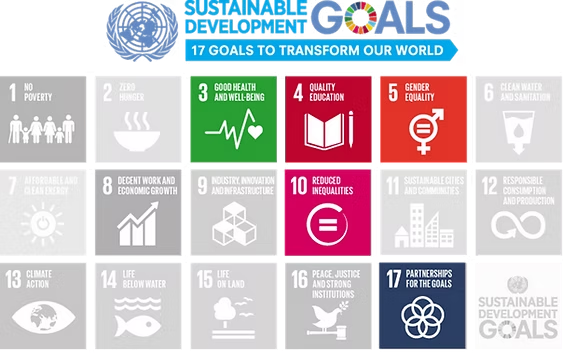
Recognising the interconnectedness of the SDGs, the Planning Committee for my Presidency has prioritised four goals to guide WPA efforts: Quality Education (SDG 4), Gender Equality (SDG 5), Reduced Inequality (SDG 10), and Partnerships to Achieve the Goal (SDG 17).
We recognise Quality Education (SDG 4) as a powerful tool for improving mental health by raising awareness and reducing stigma.
Gender Equality (SDG 5) is integral to the WPA’s mission. Due to disproportionate societal pressures, discrimination, and violence, gender is strong predictor of poor mental health. The WPA will work to develop gender-sensitive mental health services and to facilitate equal access to all services for all genders.
Reduced Inequality (SDG 10) is similarly critical. The WPA is determined that access to psychiatric, mental health, and public mental health services should be a right for all individuals, regardless of their socio-economic and cultural background. Reaching this goal will necessitate addressing financial obstacles, reaching geographic locations that hinder access to services, and overcoming language and cultural barriers.
Finally, Partnerships to Achieve the Goal (SDG 17) highlights the importance of collaborative efforts. Promoting mental health and well-being requires trans sectoral cooperation from all pockets of society – governmental, private, civil, and everyone in between, including healthcare, public health, sustainability, climate action, labour, housing, education, financial, philanthropic, and community organisations. Through such partnerships, it is possible to leverage the pooled resources, reach, and expertise of multiple stakeholders to effectively address mental health issues at the systemic, not only individual, level.
Wasserman D. (2021). Future WPA President's public mental health agenda. World Psychiatry, 20(2), 309–310.
Wasserman, D., Arango, C., Fiorillo, A., Levin, S., Peters, A., Rao, P., Sanchez-Villanueva, T., & Sylla, A. (2023). Improving mental health through fostering healthy lifestyles in young people: one of the targets in the WPA Action Plan 2023-2026. World Psychiatry, 22(3), 488–489.
Wasserman, D., Arango, C., Fiorillo, A., Levin, S., Peters, A. C., Rao, G. P., Sylla, A., & Sanchez-Villanueva, T. (2023). Pushing forward public mental health agenda and promotion of mental health. World Psychiatry, 22(1), 170–171.
Wasserman D. (2023). Mental health for all: fostering healthy lifestyles. World Psychiatry, 22(2), 343–344.
Fleischmann, A., Bertolote, J. M., Wasserman, D., De Leo, D., Bolhari, J., Botega, N. J., De Silva, D., Phillips, M., Vijayakumar, L., Värnik, A., Schlebusch, L., & Thanh, H. T. (2008). Effectiveness of brief intervention and contact for suicide attempters: a randomized controlled trial in five countries. Bulletin of the World Health Organization, 86(9), 703–709.
Riblet, N. B. V., Shiner, B., Young-Xu, Y., & Watts, B. V. (2017). Strategies to prevent death by suicide: meta-analysis of randomised controlled trials. The British Journal of Psychiatry, 210(6), 396–402.
Riblet, N. B., Shiner, B., Schnurr, P., Bruce, M. L., Wasserman, D., Cornelius, S., Scott, R., & Watts, B. V. (2019). A Pilot Study of an Intervention to Prevent Suicide After Psychiatric Hospitalization. The Journal of Nervous and Mental Disease, 207(12), 1031–1038.
Riblet, N. B., Stevens, S. P., Watts, B. V., Gui, J., Forehand, J., Cornelius, S., Powell, R., Lewicki, K., Wasserman, D., & Shiner, B. (2021). A Pilot Randomized Trial of a Brief Intervention to Prevent Suicide After Inpatient Psychiatric Discharge. Psychiatric Services, 72(11), 1320–1323.
Riblet, N. B., Varela, M., Ashby, W., Zubkoff, L., Shiner, B., Pogue, J., Stevens, S. P., Wasserman, D., & Watts, B. V. (2022). Spreading a Strategy to Prevent Suicide After Psychiatric Hospitalization: Results of a Quality Improvement Spread Initiative. The Joint Commission Journal on Quality and Patient Safety, 48(10), 503–512.
Leichsenring, F., Steinert, C., Rabung, S., & Ioannidis, J. P. A. (2022). The efficacy of psychotherapies and pharmacotherapies for mental disorders in adults: an umbrella review and meta-analytic evaluation of recent meta-analyses. World Psychiatry, 21(1), 133–145.
